Learning Spanish and Arabic in Granada, Spain
Article and photos by Anna Rose Maine
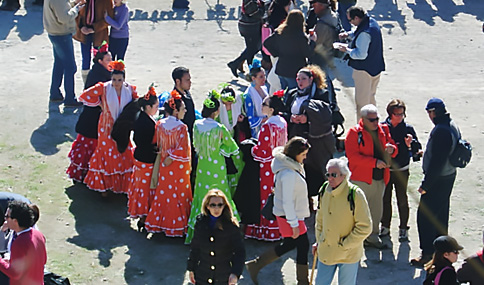
|
|
Flamenco dancers gather before performing at the Dia de San Cecilio festival in Sacromonte. |
Granada, Spain
“You have to invent a story. That’s the only way you’ll remember the steps,” Marta says to me with a smile as she twirls around the tiny patio in the flamenco bar with dramatic gestures that render me dizzy. She is trying to teach me flamenco, and I am trying to copy her every graceful move. I am not a dancer. You can ask anyone. I have no sense of rhythm and usually move as little as possible on the dance floor.
But since coming to Spain, I have been doing many things I wouldn’t normally do. I’ve started eating fish, for example. I’ve put an honest effort into learning the flamenco, though I’m not sure I’ll ever look as good as my host sister Marta. I kiss people on both cheeks when I meet them. This can be very time-consuming when Marta introduces me to a large group of her friends. I’ve been trying to get out of my comfort zone, as you are taught in guidebooks and study abroad orientation sessions.
I have wanted to travel ever since I can remember. I recall my excitement as a kid when we got another exotic postcard from my uncle, a sociology professor who worked in Europe, Africa, and China. I was mesmerized by faded photos of water buffalo, long-necked women balancing jugs of water, and craggy mountain scenes like nothing I’d ever seen in New England.
My interest in other cultures continued through high school and college. Eventually, I chose Translation as my major at Brown University. My primary focus has been Spanish, but last year, I began studying Arabic and fell in love with it. Studying abroad was a natural extension of my experience as a language student. I started attending study abroad fairs at my university, where various fellowships and study abroad programs were suggested to take me worldwide.
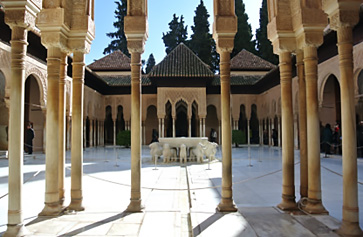
|
|
Patio de los leones in the Alhambra.
|
Finding a Study Abroad Program
With knowledge of Spanish and Arabic, I had a host of countries where I could study. However, because I was exploring study abroad options in late 2011 and early 2012, the Arab Spring was fresh on my mind. I’d heard stories about American students who’d had to flee Egypt with only a month of classes completed, so I decided to pick a Spanish-speaking country to base my studies, hoping for more political stability. My concentration advisor recommended an up-and-coming translation program Brown offered at the University of Granada in Spain. I jumped at the chance to finally become fluent in Spanish, and I hoped that Spain’s geographic location might permit me to travel to an Arabic-speaking country while I was there.
In preparation, it’s often a good idea to seek out other students who have studied where you will be studying. Because my program was brand-new, I couldn’t ask specific questions about the university courses. However, my program coordinators were able to tell me about the city and its Arabic history. I asked them basic questions about withdrawing money and the best mobile phone plan. Somebody once told me that bigger cities are more international and have more English speakers. Smaller cities tend to provide better language immersion experiences.
Living in Granada has caused my reliance on my Spanish entirely, so my language skills have improved. No other Americans are in the Faculty of Translation, which has widened my social horizons. I enjoy being in a smaller city because I have gotten to know it intimately, but I don’t feel I lack things to do. Granada is most definitely a university city, with a large portion of the population being students (and many are international). The characteristics of a location relate to the needs of each student, and they are essential to consider when choosing a program.
The Study Abroad Search
Process
When searching for the right study abroad experience, consulting school advisors and other students is helpful. But the most critical questions are the ones you ask yourself:
-
What kind of experience (academic, social, service) do I want?
-
Do I want to be in a large city or a small one? Or would I prefer rural life?
-
Will I be able to thrive in a country with very different cultural values than my own?
Answering these questions will help direct your search, but part of your experience will be adjusting your expectations to reality. Usually, the reality is far more interesting.
|
Student Life Abroad
I spent my first three weeks in Granada at the Center for Modern Languages. This institution is part of the University of Granada. Nevertheless, it has many students enrolled for a month or two at a time to learn the Spanish language. Socially, the Center for Modern Languages was a blast. The classes were interesting but manageable, and there were numerous hikes and city outings where we could participate with our new friends. The Faculty is much more academically challenging (which I prefer) and was a little harder to get used to socially because I was one of a handful of international students in a predominantly Spanish school. But I valued these newer friendships because I felt a deeper connection with my classmates.
Finding balance is one of the most challenging aspects of adjusting to life at a new university. You want to get something out of your classes, but you’ll also want to “experience Spain” and learn as much about the culture as possible.
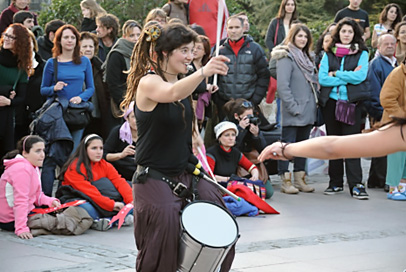
|
|
A street performance in Plaza del Triunfo (Granada).
|
After the CLM, I began classes at the Faculty of Translation and Interpretation.
One of my most valuable activities has been my weekly language exchange with Lucia, a PhD student from Cordoba. We walked around the city for an hour, and I spoke Spanish while she practiced her English. I became open to her perspectives on everything from bullfighting to shopping. These language exchanges are fun and diverting but also help bolster my Spanish skills.
Staying Connected
After announcing that you’re studying abroad, many people ask how you’ll stay in touch with friends and family. It’s a decidedly personal choice. I decided not to keep a blog because I felt it was too public for many of the personal things I would write, nor was it as personal as a letter or postcard sent individually. Maybe in this day and age, I am alone in my love for the written word, but I still cling to those memories of my uncle’s letters postmarked from another time zone. Instead, I have Flickr and Facebook accounts, where I regularly post photos. And I have written dozens of postcards and letters, mindful of the importance of that personal touch and the thrill of receiving correspondence from another continent.
Traveling and Learning
While in Spain, I took two kinds of trips, and I recommend each for different reasons. At the end of February, I participated in a program called Morocco Exchange. The four days we spent traveling to and around Morocco were some of the best in my life. We started in Tangier, spent a few hours in Asilah, and a day in Rabat, with a final stop in Chefchaouen. We did a few touristy things, such as visiting the king’s mausoleum and some magnificent Roman ruins in Chellah. But we also had the opportunity to converse with real Moroccan students, who answered our questions frankly and with good humor. I learned that most Moroccans are multi-lingual, with facts about Muslims, as well as information about a few hot-button political issues.
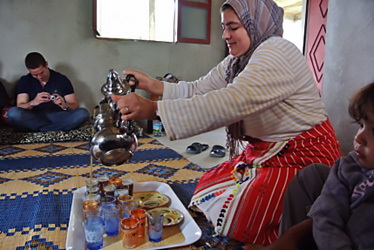
|
|
Serving traditional Moroccan tea in a small village outside Chefchaouen.
|
About a month later, Spain celebrated Semana Santa (the week before Easter) with a weeklong vacation, and I planned a spur-of-the-moment trip to Valencia. Alone. It was challenging and a little lonely but a fantastic experience. I liked the freedom to do what I wanted when I wanted, and I also had the opportunity to meet some incredible people at the hostel. It can be extremely satisfying to do things yourself, like navigating an entire city by bicycle. However, one must take care, especially as a female, and be more vigilant when traveling alone.

|
|
City of Arts and Sciences in Valencia.
|
It’s a natural human instinct to want to control every situation. Traveling has taught me that this is impossible. But things usually do work out in the end. Buses break down. Planes are delayed. Taxi drivers bring you to the wrong hotel. Plans are thrown into flux because of inclement weather. In my experience traveling, having access to plenty of cash and a credit card while in transit was helpful. I have learned to be assertive (but courteous), stay relaxed, and not get overly stressed when things don’t go according to plan. Most importantly, I have become unashamed about asking for help or directions because it usually saves time and frustration.
Reflection
As I write this, I sit at the desk in my bedroom in Granada. I have tried to reflect on my experience in the words above, but I know I will gain a whole new perspective when I return home. And this (aside from a big bowl of Chinese food) is what I am most looking forward to about my return. But until then, I cherish those moments that every study abroad student experiences: those moments when you are awestruck. It might happen the first time you ride a camel or stumble into an authentic clothes-off Arab bath. Or it might happen as you gaze up at the Alhambra’s amber walls. Or as you laugh breathlessly with your host family as you desperately try to pronounce Arnold Schwarzenegger. The last time it happened to me, I was walking down the street at dusk, listening to someone play the accordion. The moon was out, and the air smelled of oranges. And I was quietly overwhelmed with gratitude at how lucky I was to be there.
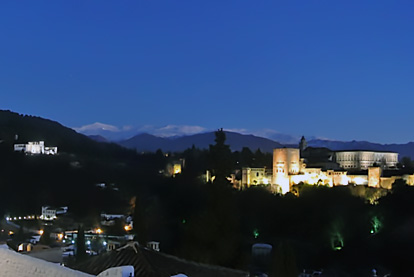
|
|
The Alhambra and Generalife at night. Sierra Nevadas in background.
|
My Spanish (and Moroccan) experiences have reaffirmed my belief in the importance of studying languages. The American educational system emphasizes math, science, and written expression in English over learning a foreign language. This is likely the result of a cultural attitude that persists: the rest of the world speaks English, so why bother learning a foreign language? This is a reasonable question in this age of Google Translate and iPhone apps that make lightning-fast translations. Speaking a foreign language is as symbolic as it is practical. People in Spain and Morocco alike have reacted with surprise and pleasure and applauded my muddled efforts to speak to them in their tongue. It shows you value their culture and language enough to study it. It’s a valuable exercise in humility when you realize some toddlers can speak better than you. And for me, that unending quest for fluency is really appealing, intellectually.
Since I plan on continuing my language studies, it is only a matter of time before I pack my suitcases and leave the U.S. again. Morocco frequently returns to my thoughts with its mountains, spice-scented air, and delicious food. I want to come back. I am currently exploring fellowship and scholarship options after graduation. I don’t know where or how I’ll get there, but I know I’ll be on the move again soon with a handful of postcards waiting to be sent.
Anna Rose Maine was a student at Brown University who is scheduled to graduate in 2014. She studied translation in the department of comparative literature and participated in the Brown Traductores Program in 2013 at the University of Granada.
|
